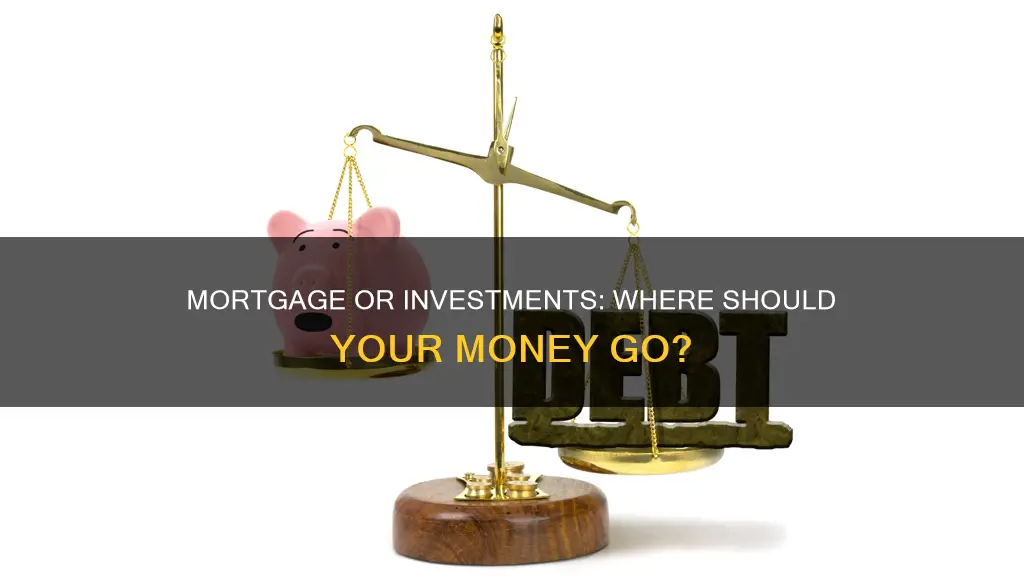
Paying off your mortgage or investing your money is a common dilemma for many homeowners. The answer depends on your individual circumstances, but there are several factors to consider when making your decision.
Firstly, how comfortable are you with risk? Paying off your mortgage is generally considered a safer option, as it's predictable and you know exactly how much you're saving. On the other hand, investing in the stock market comes with the potential for higher returns, but it's also riskier and more unpredictable.
Secondly, how far into your mortgage are you? If you're still in the early years of your mortgage, it might be better to pay it off early, as you'll save more on interest. However, if you're well into a 30-year mortgage, you're likely paying more of the principal and less interest, so investing could be a better option.
Thirdly, consider your interest rate. If you have a high-interest rate on your mortgage, it's usually a good idea to make paying it off a priority. However, if your interest rate is relatively low, you might be better off investing your money elsewhere.
Finally, think about your financial situation as a whole. Do you have sufficient emergency savings? Are you putting away enough for retirement? How much other debt do you have? Answering these questions will help you decide whether to pay off your mortgage or invest your money.
| Characteristics | Values |
|---|---|
| Interest savings | Paying off your mortgage early can save you thousands in interest payments. |
| Peace of mind | Being debt-free can ease your burden and prevent the risk of losing your home to foreclosure. |
| Build equity | Paying down your mortgage faster means building equity in your home more quickly, which can help you qualify for refinancing. |
| Opportunity cost | Any extra money spent on paying down your mortgage is money that can't be used for other financial goals. |
| Wealth is tied up | Property is an illiquid asset, meaning you can't convert it to cash quickly or easily. |
| Loss of tax breaks | If you choose to pay down your mortgage instead of maxing out your tax-advantaged retirement accounts, you'll lose out on tax deductions. |
| Higher returns | Investing in the stock market has the potential for higher returns than paying off your mortgage early. |
| Liquid investment | Stocks, bonds, and other market investments offer better liquidity than property. |
| Employer match | Investing in a retirement account may come with the benefit of employer-matched contributions. |
| Higher risk | The stock market is riskier than paying off your mortgage, with the potential for both gains and losses. |
| Increased debt | Investing instead of paying off your mortgage means you'll still have debt to your name. |
What You'll Learn
- Paying off your mortgage early saves you thousands in interest payments
- Paying off your mortgage gives you peace of mind and eases your financial burden
- Paying off your mortgage early may be a better option if your mortgage rate is comparable to investment returns
- Investing instead of paying off your mortgage may give you higher returns
- Investing in a retirement account may allow you to take advantage of perks like employer matching and tax breaks

Paying off your mortgage early saves you thousands in interest payments
Paying off your mortgage early can save you a lot of money in interest payments. Even a small extra monthly payment can allow you to own your home sooner.
Let's look at an example. Say you borrow $150,000 to buy a home at 6% interest with a 30-year term. By the time you pay off your loan, you'll have paid a whopping $173,757.28 in interest. Now, let's say that you pay an extra $100 every month towards a loan with the exact same term, principal, and interest rate. At the end of the term, you'll have paid $128,170.57 in interest. That's a saving of $45,586.71.
Contributing just $50 extra a month can help you pay off your mortgage years ahead of schedule. The best candidates for early mortgage payoffs are those who already have enough money to cover an emergency. You'll want at least three to six months' worth of household expenses in liquid cash before you focus on paying off your mortgage. This is because it's much more difficult to take money out of your home than it is to withdraw money from a savings account.
If you've received a raise or some other increase in your income and you're still in the early years of your mortgage, paying it off early might be the best option for you. You'll save on interest, be debt-free, and free up funds for investing in your future or personal hobbies.
However, paying off your mortgage early might not always make the most sense financially. If you have other high-interest debt, such as credit card debt or student loans, you might save more by paying these off first. Additionally, paying off your mortgage early means you'll no longer be eligible for the federal mortgage interest tax deduction, and you might miss out on potential higher returns from other investments.
Ultimately, the decision to pay off your mortgage early depends on your personal financial situation and goals. Consult a financial advisor to help you make a plan that's right for you.
Luckin Coffee: Invest Now?
You may want to see also

Paying off your mortgage gives you peace of mind and eases your financial burden
Paying off your mortgage can bring peace of mind and reduce your financial burden. Here are some reasons why:
Peace of Mind
If you don't like the idea of being in constant debt, paying off your mortgage early can ease your burden and provide peace of mind. Being debt-free means no longer having to worry about making monthly mortgage payments. This can be especially important if you experience a financial emergency, as you won't have to worry about missing payments and potentially losing your home to foreclosure.
Financial Freedom
Paying off your mortgage early can free up a significant amount of money that was previously tied up in monthly payments. This extra money can now be used for other financial goals, such as investing in your future, saving for retirement, or pursuing personal hobbies.
Savings on Interest
By paying off your mortgage early, you can potentially save thousands of dollars in interest payments over the life of the loan. This is because, in the early years of a mortgage, most of the monthly payments go towards interest rather than reducing the principal amount. By reducing the principal early on, you can significantly lower the total interest cost.
Building Equity
Paying down your mortgage faster allows you to build equity in your home more quickly. This can put you in a better position to qualify for refinancing, which can lead to even more savings in the long run. Additionally, the increased equity can be leveraged in the form of a home equity loan or line of credit, providing access to cash for home improvements or paying off other high-interest debt.
Reduced Risk
Paying off your mortgage early can reduce your financial risk. Investing in the stock market or other risky assets can offer higher potential returns but also carries the risk of significant losses. By paying off your mortgage, you eliminate the risk of losing money in volatile markets and ensure the stability of owning your home outright.
Investment Demand Curve: Right-Shifting Factors
You may want to see also

Paying off your mortgage early may be a better option if your mortgage rate is comparable to investment returns
If you are in the early years of your mortgage, you are likely paying mostly interest on your mortgage payments. By paying off your mortgage early, you can save thousands of dollars in interest that you would have paid if you had not reduced the principal amount early on. This is because the payments you make in the early years of your mortgage go towards the interest on the loan, not the principal itself. Therefore, any extra payments will reduce the total amount of interest owed over the course of the entire loan.
Additionally, paying off your mortgage early can provide peace of mind and a sense of financial freedom. You will no longer have to worry about constant debt and can redirect the money you were using for monthly payments towards investing in your future or personal hobbies.
However, it is important to consider the opportunity cost of paying off your mortgage early. By doing so, you may be sacrificing the potential for higher returns on your investments. The stock market has historically returned an average of about 10%, and some investments may offer even higher returns. Therefore, if you have a low mortgage rate, it may make more financial sense to invest your money instead of paying off your mortgage early.
Ultimately, the decision to pay off your mortgage early or invest depends on your financial situation and risk tolerance. Consult a financial advisor to help you make the best decision for your circumstances.
Uber: Invest or Avoid?
You may want to see also

Investing instead of paying off your mortgage may give you higher returns
If you have extra money and are considering whether to put it towards your mortgage or invest it, it's important to weigh up the pros and cons of each option. Both are worthy goals, and there is no one-size-fits-all answer. However, investing instead of paying off your mortgage may give you higher returns. Here are some things to consider:
- Higher rate of return: Investing in something like the stock market comes with higher risk, but it also offers the potential for higher rewards. Historically, the stock market has offered a higher average rate of return than the average mortgage interest rate.
- Liquidity: Investments like stocks, bonds, mutual funds and ETFs are more liquid than a mortgage. This means that if you need cash quickly, you can sell your investments more easily than selling your home or attempting a cash-out refinance.
- Employer match: If you're investing in a retirement account and your employer offers a match, you can benefit from compound earnings on that extra money over time.
- Risk: Investing is riskier than paying off a mortgage. There is a potential for significant gains and losses in the stock market, so you need to weigh your comfort level with risk.
- Debt: If you invest instead of paying off your mortgage, you will still have to make mortgage payments. Investing will not eliminate your debt in the immediate term, but over time, it's possible to earn more on your investments than you would save by paying off your mortgage early.
If you're still unsure about whether to invest or pay off your mortgage, it's a good idea to consult a financial advisor. They can help you assess your finances, risk tolerance, and investment options to make a decision that's right for you.
Invest Now: Where to Put Your Money
You may want to see also

Investing in a retirement account may allow you to take advantage of perks like employer matching and tax breaks
Investing in a retirement account can be a great way to take advantage of various perks that can boost your savings and help you build a secure financial future. Here are some reasons why investing in a retirement account can be beneficial:
Employer Matching
If your employer offers a retirement plan such as a 401(k), they may also provide a matching contribution up to a certain percentage of your salary. This essentially means free money that you can put towards your retirement savings. Employer matching contributions can significantly increase the balance of your retirement account over time, so it's an opportunity you don't want to miss out on.
Tax Breaks
Retirement accounts often come with tax advantages that can help your savings grow faster. For example, contributions to a 401(k) or traditional IRA may be tax-deductible, lowering your taxable income for the year. Alternatively, you can choose a Roth IRA or Roth 401(k), where you pay taxes upfront on your contributions and then enjoy tax-free withdrawals in retirement. Either way, you benefit from tax breaks that can make a big difference in the long run.
Compound Interest
The power of compound interest is another advantage of investing in a retirement account. When you invest early and consistently, your investment earns interest, and that interest also earns interest over time. This compounding effect can lead to significant growth in your retirement savings, especially if you start investing in your 20s or as soon as you start earning an income.
Liquidity
Investing in stocks, bonds, or similar vehicles through a retirement account provides better liquidity than investing in real estate. If you need cash, selling stocks or other similar investments is generally much quicker and easier than selling a home or dealing with the complexities of a cash-out refinance.
Peace of Mind
By investing in a retirement account, you are taking control of your financial future and ensuring that you will have the funds to maintain your desired lifestyle during retirement. This can give you peace of mind and reduce the stress associated with worrying about your financial security in your golden years.
Silver: Inflation Hedge
You may want to see also
Frequently asked questions
The pros of paying off a mortgage include saving on interest, being debt-free, building equity, and freeing up funds for other investments.
The cons of paying off a mortgage include cutting into savings, missing out on tax deductions, and potentially paying prepayment penalties.
The pros of investing include potentially higher returns, increasing future wealth, better liquidity, and the potential for an employer match.
The cons of investing include higher risk, the need to continue making payments, and the possibility of losing money.
Some factors to consider include emergency savings, retirement savings, other debt, income prospects, and expected portfolio returns.







